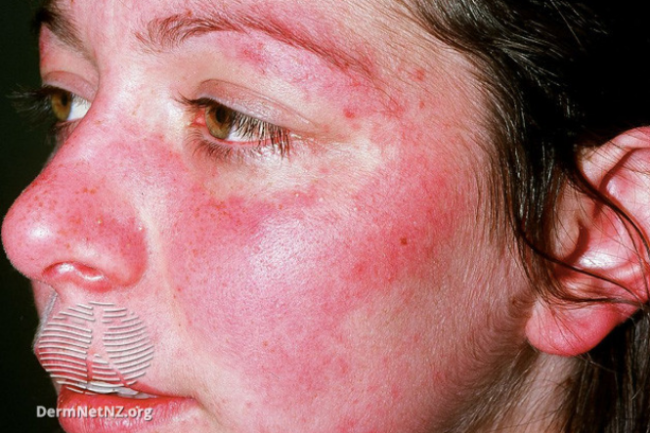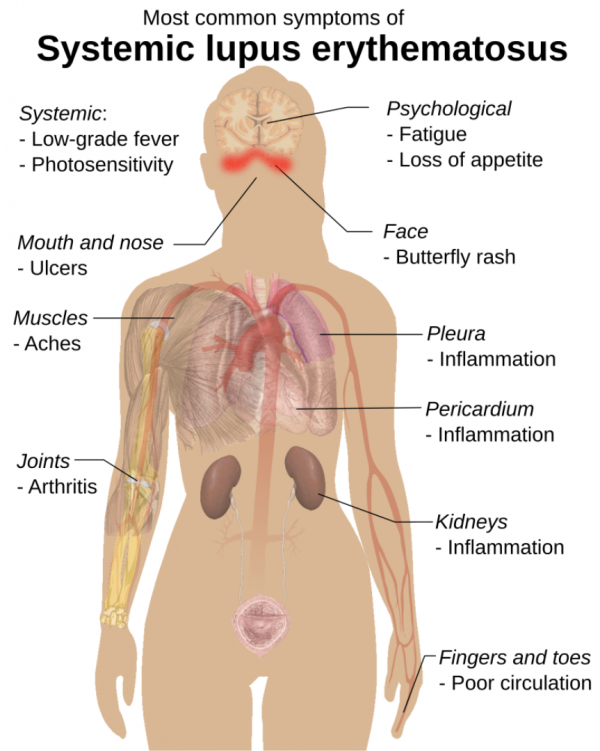If you're a frequent visitor to Healthify, why not share our site with a friend? Don't forget you can also browse Healthify without using your phone data.
Lupus
Also called systemic lupus erythematosus or SLE
Key points about lupus
- Lupus is an inflammatory condition which can affect joints, skin and other parts of the body.
- It's an autoimmune disease where your immune system produces antibodies which attack healthy tissue.
- Symptoms are varied and can include joint pain, fatigue, skin rashes, headaches and depression.
- There's no cure but symptoms can be managed with medicines and lifestyle changes.

Lupus is a type of autoimmune condition. This mean that your body's immune system produces antibodies that attack healthy tissue as if it was a foreign body, such as bacteria or a virus.
Lupus is a chronic (long-term) and complex condition that affects different people in different ways. It may affect joints and skin. It can also affect blood vessels and internal organs, such as your kidneys, brain, heart and lungs.
Approximately 1 in every 900 people in Aotearoa New Zealand is diagnosed with lupus. It's more common in Pacific Peoples, Māori and Asian people, and in other ethnic groups with darker skin. It can occur in men, women and children, but it's much more common in women and is usually diagnosed between the ages of 15 and 45.
Video: What is lupus? (11 minutes 36 seconds)
It’s not known what causes lupus, but genetic factors and female hormones may play a part.
You may have times when your lupus is well controlled, but at other times you may have flare-ups of your symptoms. Things that can trigger flare-ups include:
- UV rays from the sun, sunbeds, or fluorescent light bulbs
- infections (colds, flu)
- smoking
- certain medicines, including some antibiotics
- physical and emotional stress
- hormones and hormonal contraceptives.
Drug-induced lupus happens as a reaction to some medicines. It tends to be milder than other forms of lupus, and usually goes away after the medicine is stopped.

Image credit: DermNet NZ(external link)
Lupus has many symptoms which vary from person to person, so it can be hard to diagnose. The symptoms can also be similar to several other conditions.
Key symptoms of lupus include:
- joint and muscle aches and pains, especially in your hands and feet
- rashes, including a butterfly-shaped rash on your cheeks (shown in the picture above)
- tiredness due to anaemia (low number of red blood cells)
- weakness
- recurring flu-like symptoms
- headaches, migraines
- ulcers in your mouth or nose
- dry eyes
- hair loss
- depression and anxiety
- chest pain
- weight loss
- mild fever.

Image credit: Mikael Haggstrom via Wikimedia Commons(external link)
There’s no single test for lupus. If you have some of the symptoms mentioned above, visit your healthcare provider for further assessment. They’ll ask you questions about your symptoms and examine you. You may also need blood and urine tests . If you have typical symptoms as well as high levels of certain antibodies it usually indicates that you have developed lupus.
If your healthcare provider thinks you might have lupus, they are likely to refer you to a rheumatologist (a doctor who specialises in autoimmune and inflammatory conditions of joints).
There’s no cure for lupus, but you can manage and control it with medication and lifestyle changes.
Treatment for lupus may vary depending on the severity of symptoms and which parts of your body are affected.
Medicines for lupus include:
- non-steroidal anti-inflammatory drugs (NSAIDS) for muscle and joint pain
- disease-modifying anti-rheumatic drugs (DMARDs), such as hydroxychloroquine and methotrexate
- oral steroids to reduce inflammation if symptoms are severe
- biological medicines, which specifically target parts of the immune system
- steroid creams and ointments for skin rash.
There are things you can do to help improve your symptoms and reduce the chance of flare-ups.
- If you smoke, stop – smoking makes lupus worse. Find out how to stop smoking.
- Protect yourself from the sun – wear long-sleeved clothing and wide-brimmed hats and use sunscreens to prevent skin rashes.
- Avoid sunbeds.
- Stay away from people with a cold or flu or other infections.
- Get vaccinated against influenza and COVID-19.
- Make time for rest and relaxation.
- Know what triggers your symptoms so you can prevent flare-ups or stop your symptoms from getting worse. Keep a diary of your symptoms and note things you did or that happened before you had a flare. Share this information with your healthcare provider so they can help keep your condition under control.
- Seek support from whānau, friends, medical professionals, and support groups.
Apps reviewed by Healthify
You may find it useful to look at some Meditation and mindfulness apps, Quit smoking apps and Sun safety apps.
Lupus is a chronic and variable condition and is different for each person. It’s common to experience flare-ups and other times when you have few or no symptoms. Most people will do well with a combination of medication, lifestyle changes and good support networks.
Many people have mild-to-moderate symptoms and lead active lives, however a few people will have severe disease.
Arthritis NZ(external link) has a lupus online support group(external link) for people living with lupus to connect with one another, share stories, offer support, and ask questions. You can also phone Arthritis NZ free on 0800 663 463 for information and advice.
Brochures
What is Lupus? (SLE) fact sheet(external link) Arthritis NZ
Apps
Meditation and mindfulness apps
Quit smoking apps
Sun safety apps
References
- Lupus (SLE)(external link) Arthritis NZ
- Lupus – systemic lupus erythematosus(external link) Patient Info, UK, 2023
- Lupus (systemic lupus erythematosus)(external link) Health New Zealand | Te Whatu Ora, NZ, 2024
- Lao C, White D, Rabindranath K, et al. Incidence and prevalence of systemic lupus erythematosus in New Zealand from the national administrative datasets(external link) Lupus 2023 Jul;32(8):1019–1027
Credits: This content has been collaboratively developed by Health New Zealand | Te Whatu Ora, KidsHealth, and Healthify He Puna Waiora to provide trusted health information.
Reviewed by: Dr Emma Dunning, Clinical Editor and Advisor
Last reviewed:





